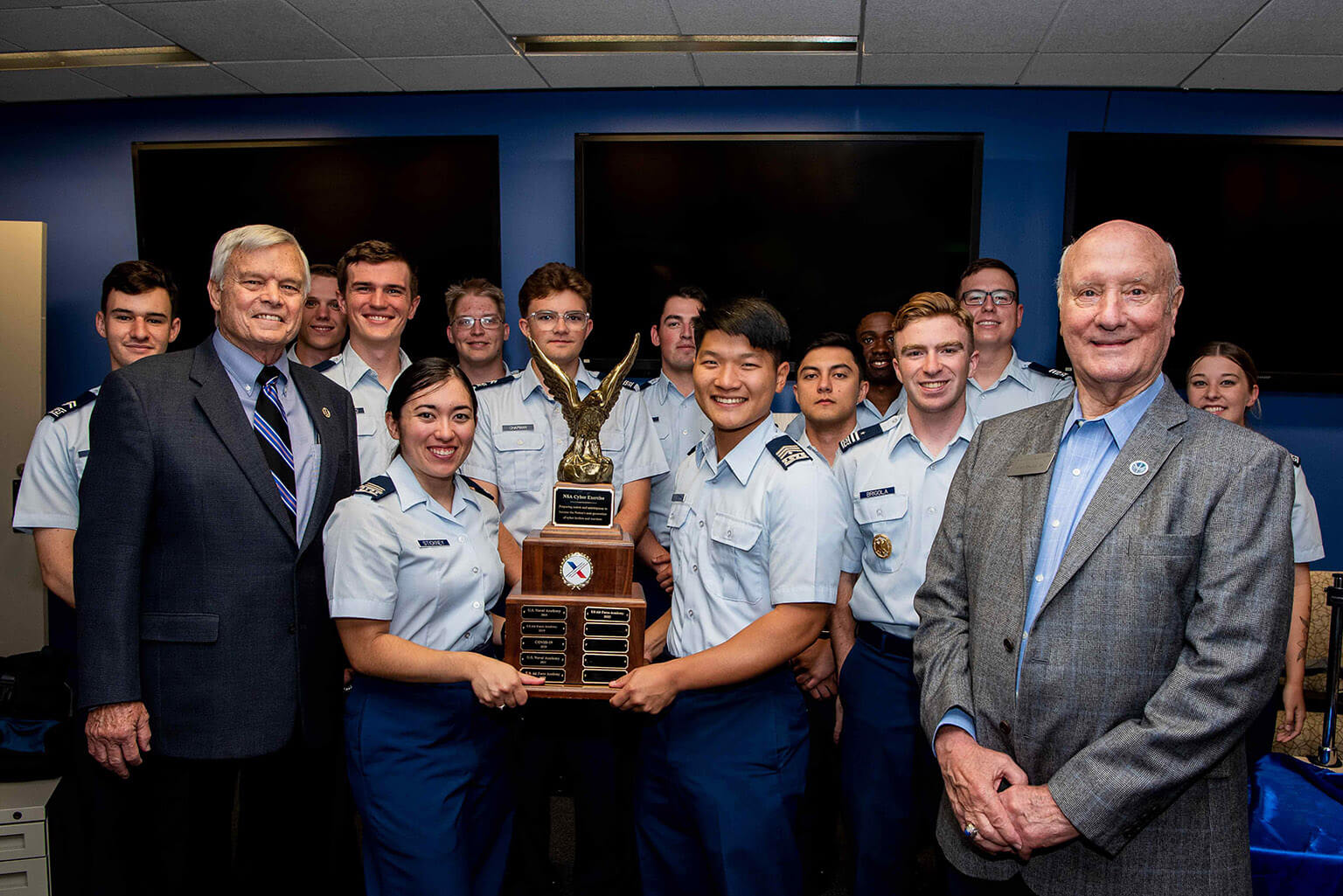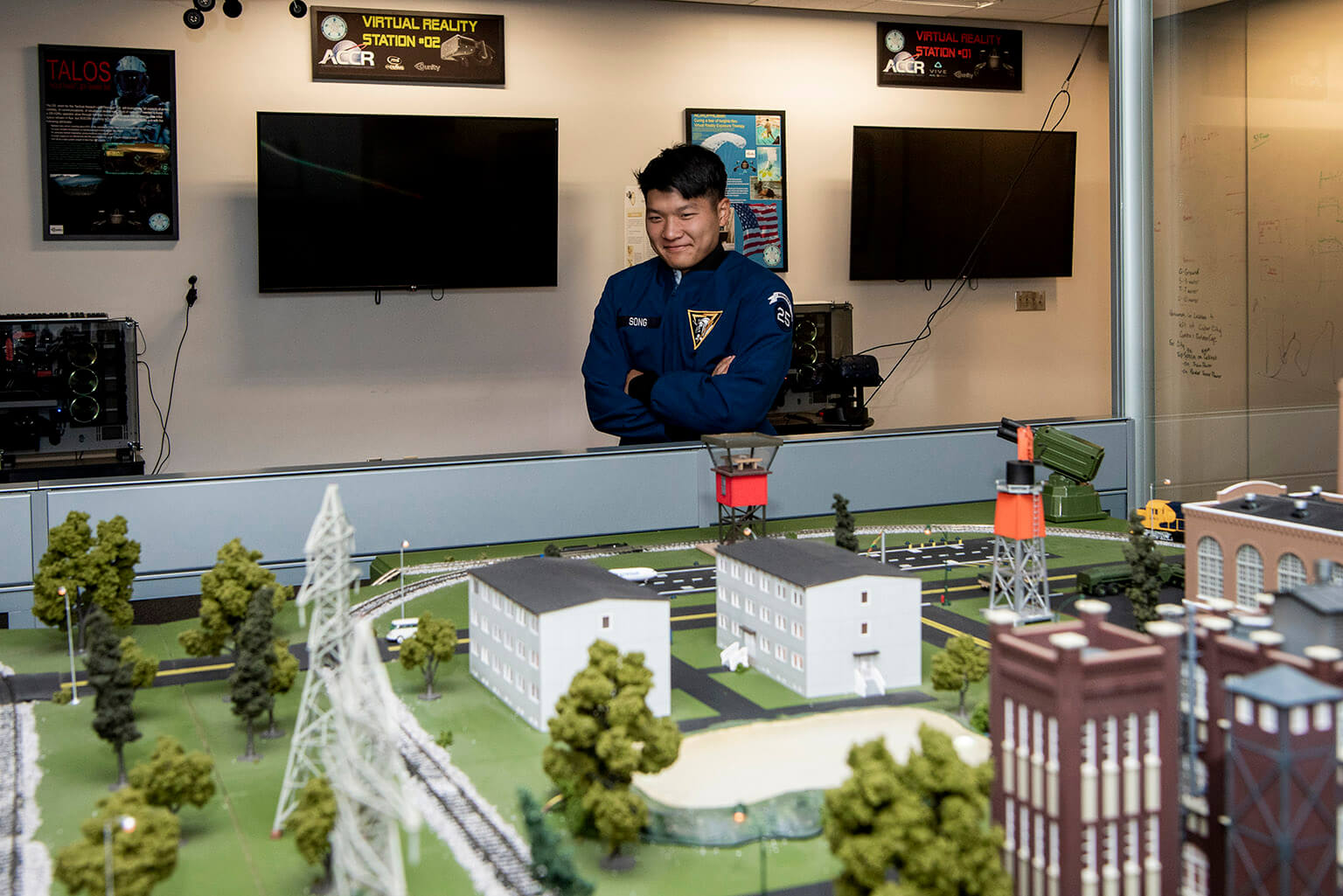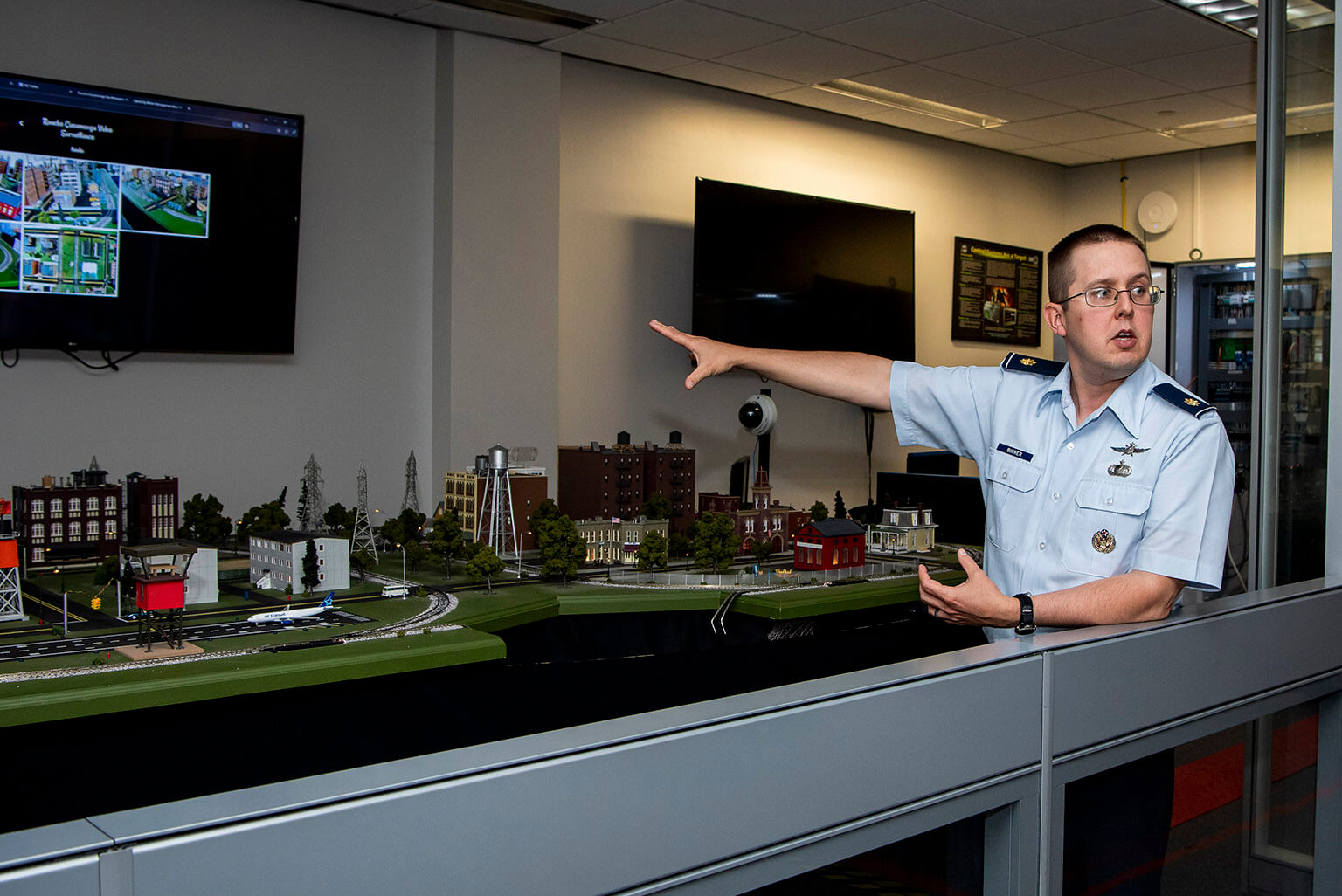Cadets develop cyber skills in classroom and competition
 U.S. Air Force Academy Department of Cyber and Computer Sciences cadets and faculty pose with the 2023 National Security Agency Cyber Exercise Trophy August 28, 2023. The department won the trophy for the second consecutive year. (U.S. Air Force photo by Justin Pacheco)
U.S. Air Force Academy Department of Cyber and Computer Sciences cadets and faculty pose with the 2023 National Security Agency Cyber Exercise Trophy August 28, 2023. The department won the trophy for the second consecutive year. (U.S. Air Force photo by Justin Pacheco)
By Randy Roughton
U.S. Air Force Academy Strategic Communications
U.S. AIR FORCE ACADEMY, Colo.- U.S. Air Force Academy cyber and computer sciences cadets hone their skills in the classroom and competitions against the best computer hackers in the world.
A superior cyber education
The Academy continues to be a leader in cyber education with one of the first accredited Cyber Science degree programs in the world. During their freshman year, cadets learn about networks, defenses, malware and the stages of a cyberattack through the core computer science course. Additionally, cadets live the life of an Air Force cyber operator for five days in a summer cyber operations course. They plan, brief, execute and debrief offensive and defensive cyber operations.
Through a rigorous course of study using the latest technologies, cadets learn computer programming, embedded systems, networks, telecommunications, reverse engineering, digital forensics, and cyber operations.
Developing cyber skills through competition
The U.S. Air Force Academy Cyber Competition Team participated in 18 national competitions in the past year. The team began the year by sweeping first through third place at the Rocky Mountain Cyber Symposium in Colorado Springs, Colorado. Next was the SysAdmin, Audit, Network and Security (SANS) Academy Cup, where the team beat out sister services for first place. They then competed against the best in industry at SANS Orlando NetWars competition, taking first and second place in the Incident Handling team competition. The Cyber Competition Team finished the year by winning the National Security Agency Cyber Exercise for the second consecutive year.
For cyber cadets, competition means more than the opportunity to beat teams from sister academies and other institutions. Competing goes together with training, said Cadet 2nd Class Caleb Song.
“Competition is the best way we train,” said Song, a Computer Science major. “Almost every weekend, we have a competition, for four to six hours a day.”
Also, cadet team members train in cyber operations after classes four days a week. They use this time to hone their skills and talk about recent competitions. Each team member specializes in certain cyber areas. Song, for example, specializes in open-source intelligence, cryptography and policy.
 Cadet 2nd Class Caleb Song, a U.S. Air Force Academy Cyber Competition Team member, overlooks Cyber City, Aug. 28, 2023.
Cadet 2nd Class Caleb Song, a U.S. Air Force Academy Cyber Competition Team member, overlooks Cyber City, Aug. 28, 2023.
The Cyber Science curriculum
The curriculum culminates with a three-core sequence of Cyber Warfare, Cyber Defense and Cyber Operations with juniors branching out from basic computer science into more operational thinking.
- Cyber Warfare instructs cadets in the latest reverse engineering techniques, allowing them to tear apart code, find vulnerabilities and develop potential exploits to achieve an objective.
- Cyber Defense covers topics in advanced network design and digital forensics, creating experts in zero-trust technologies and in techniques to find adversaries hiding in networks.
- When seniors enter the Cyber Operations course, they put their technical skills in the context of a broader operation using Cyber City.
Cadets use Cyber City, a fictional large model city, to demonstrate their response to a simulated cyberattack. The model integrates the physical networking and industrial control systems used to operate a real city. This allows the cadets to conduct cyber operations and see the physical effects of cyberattacks. Cadets can understand how cyberattacks are integrated into air, sea, land and space domains. In the last year, the department added a space component to Cyber City, allowing the cadets to infiltrate a satellite through a virtualized ground station and cause effects.
 Maj. Bobby Birrer, U.S. Air Force Academy Department of Cyber and Computer Sciences cyber science branch chief, explains how cadets use the Critical Infrastructure Cyber Range, also known as Cyber City, Aug. 28, 2023.
Maj. Bobby Birrer, U.S. Air Force Academy Department of Cyber and Computer Sciences cyber science branch chief, explains how cadets use the Critical Infrastructure Cyber Range, also known as Cyber City, Aug. 28, 2023.
Prepared for the future cyber fight
“Between the formal education in the classroom and the hands-on they get in the cyber team, these cadets are coming out of here incredibly ahead of the game when it comes to going into their operational training,” Birrer said. “The cadets work so hard at this, and they are so good technically and in policy. I am blown away by how good they are.”
Cadets can graduate with confidence knowing that they are prepared to excel in the cyber domain. Plus, the Academy is one of only 20 schools nationwide certified by the National Security Agency in cyberspace operations, said Maj. Bobby Birrer, cyber science branch chief.
“We have a leg up on our peer officers because we’ve had that experience in the classroom and on the competition team,” Song said.
See more photos of the U.S. Air Force Academy Department of Cyber and Computer Sciences at Flickr.